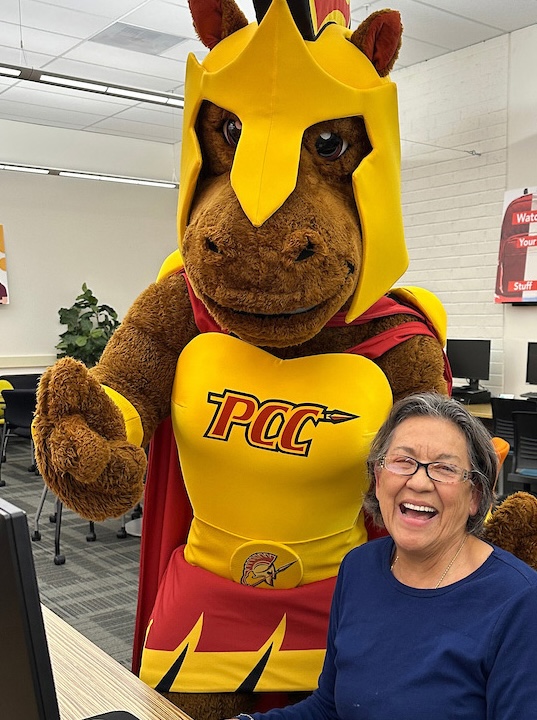Zero Textbook Costs (ZTC)
Textbooks cost too much — but they don’t have to!
PCC's Zero Textbook Cost (ZTC) classes remove the cost of required textbooks. Instead of commercial (and expensive) textbooks, ZTC classes use openly licensed materials such as OER and materials available on the Shatford Library website. OER are quality materials that have been proven to be just as effective as costly textbooks, letting you learn the same without the cost!
ZTC = Zero Textbook Cost
When you see this identifier on the Schedule of Classes, this means that the instructor of the course has chosen to use openly licensed materials so that students don’t have to buy a costly commercial textbook. In other words, enrolling in ZTC courses means you won’t have to buy a book! (Of course, you will still have to read assigned FREE readings.)
OER = Open Educational Resources
When an instructor tells you they use OER, it means they’re working to make college affordable for all and are participating in a movement based on the principle that education is a human right.

How You Can Save on Textbooks


ZTC Degree Pathways
Currently, PCC offers the following ZTC pathways:
- Administration of Justice AA-T
- Architecture AA
- Archives & Digital Collections Assistant local certificate
- Art History AA-T
- Communication Studies AA-T
- Computer Information Science CCNA
- Digitization Skills local certificate
- Geography AA-T
- History AA-T
- Humanities AA
- Journalism AA-T
- Photojournalism CoA
- Psychology AA-T
- Social and Behavioral Sciences AA
- Sociology AA-T
The following degrees will be available as ZTC Pathways, soon:
- Agricultural Plant Science, Fall 2026
- Economics, Fall 2026
- English AA-T, Fall 2027
- English Literature AA, Fall 2027
- Mathematics, Fall 2027
- Photography CoA, Fall 2026
- Physics, Fall 2027
- Product Design CoA, Fall 2026
- Public Health Science AS-T, Fall 2026

OER materials are openly licensed, which means you have permission to print and store them. In fact, anyone can use and find OER, regardless of their enrollment status!
Students, faculty, and administrators agree – textbooks cost too much! Since the 1970s, the price of textbooks has increased at a much higher rate than general inflation. This is not a new trend, and it probably isn’t shocking news. What is shocking is how much college students are being priced out of an education by expensive commercial textbooks.
As online teacher and LMS expert Scott Winstead explains, “Over the last 50 years, the cost of college textbooks has soared by a jaw-dropping
1,401%, transforming what was once a manageable expense into a significant financial
burden for students across the United States.”
Textbooks cost too much – but they don’t have to! Textbooks can be free! Textbooks
should be free!
OER are teaching, learning, and research materials that may be used freely and accessed openly. In a 2016 meta-analysis of 16 OER studies, John Hilton III found “that students generally achieve the same learning outcomes when OER are utilized and simultaneously save significant amounts of money.” OER materials are typically found in repositories such as OpenStax, LibreTexts, OER Commons, Cool4ED, Merlot, and the Directory of Open Access Journals. Everything from scholarly articles, videos, images, databases, and textbooks are licensed as OER to make college more affordable and knowledge more accessible for all.
Because they are created and peer-reviewed by the very folks who teach your classes, OER are quality materials that have been proven to be just as effective as costly textbooks. In a 2016 meta-analysis of 16 OER studies, John Hilton III found “that students generally achieve the same learning outcomes when OER are utilized and simultaneously save significant amounts of money.” Furthermore, Hilton affirms that “studies across a variety of settings indicate that both students and faculty are generally positive regarding OER.” In conclusion, Hilton asks a worthy question, “If the average college student spends approximately $1000 per year on textbooks and yet performs scholastically no better than the student who utilizes free OER, what exactly is being purchased with that $1000?”
Some examples of OER platforms that you may already use are: Wikipedia, TEDEd videos, Project Gutenberg, Google Arts and Culture, and the Open Textbook Library.
There are many places where you can find OER! The best place to start your search is with a Librarian from the Shatford Library.
Another easy way to find OER is through an Advanced Google Search. Enter words and phrases relevant to the topic or subject you are searching in the “Find pages with…” section, then choose one of the four open rights options in the “usage rights” menu (i.e. “free to use share or modify) from the “Then narrow your results by…” section.
Below, are some of the most popular OER search engines and libraries. If you’re interested in finding more openly licensed materials, ask a librarian or instructors with ZTC courses!
Students are at the heart of every OER material, so student voices matter! Your perspectives, experiences, and insights are huge motivators for OER efforts. In other words, student advocates for OER make a difference for everyone!
Advocating for OER can be as simple as asking your teacher to assign OER materials instead of costly textbooks, homework portal subscriptions, and using content codes. Another easy way to advocate for OER is by using and citing it in your assignments.
If you’re interested in going the next step (a great activity to note on college admission applications), here are some organizations and guidebooks for student OER advocates:
- Open Textbook Alliance
- The OER Student Advocate Toolkit was created by OER student leaders in the CCC and CSU systems. The toolkit's purpose is to motivate students to get involved in OER advocacy and the Open Education movement.
- Making Textbooks Affordable Toolkit
